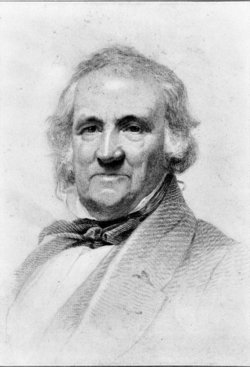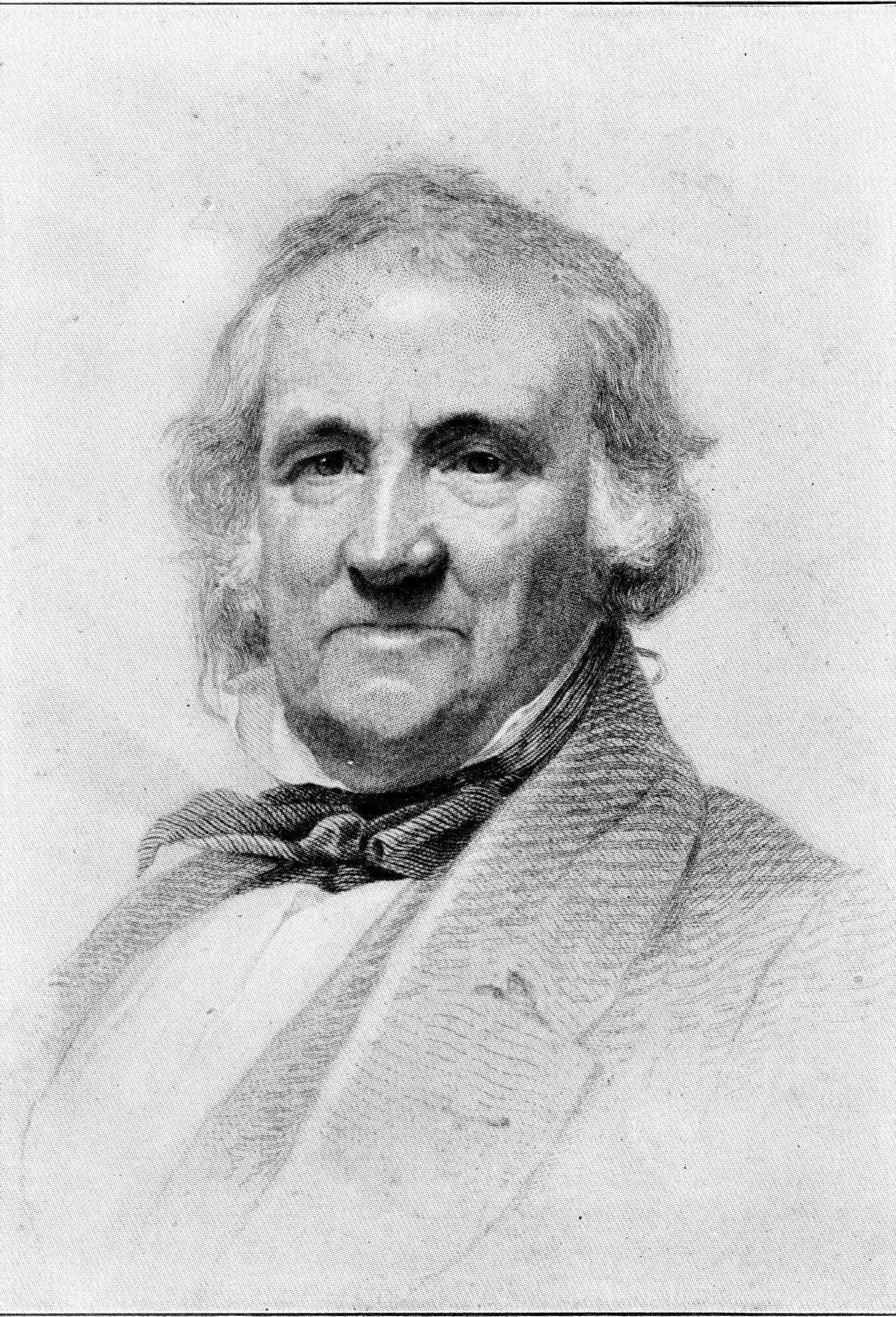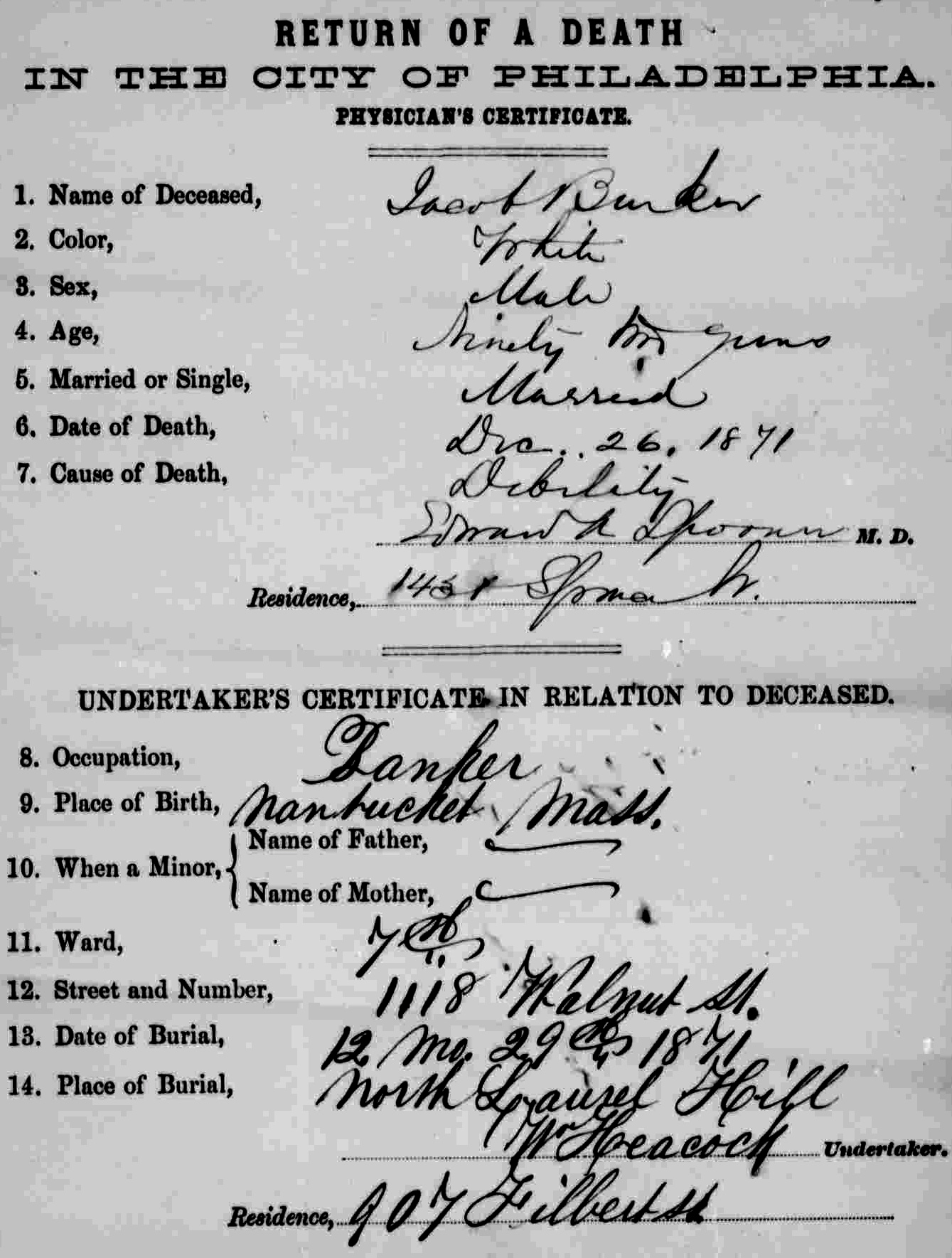Married
Banker
1118 Walnut Street, 7th Ward
Philadelphia Inquirer, December 27, 1871
"DEATH OF JACOB BARKER
Jacob Barker, one of the oldest residents of Philadelphia, died yesterday morning at the home of Abraham Barker, Esq., one of his sons, on Spruce street. The deceased was born December 18, 1778, on Swan Island, at the mouth of the Kennebec River, Maine. At the age of 16 he left home and passed a year at school in New Bedford. He commenced business in a store in Nantucket, but, tempted by love of adventure, shipped as a green hand on a packet for New York, with the intention of visiting the East Indies. He abandoned the idea, and on reaching New York entered the commission house of Isaac Hicks.
In 1801 he commenced business on his own account and at the outset of his career was ruined financially by the failure of an Irish merchant for whom he had indorsed heavily. He recovered rapidly, however, and at the outbreak of the second war with Great Britain became interested in raising national loans, in which work he was very successful. With the extension of his business he opened a banking house on Wall street. Through the failure of a Liverpool Bank this was obliged to close its doors. He then removed to New Orleans, where he was successful in business, and at the outbreak of the Rebellion was one of the largest capitalists there and a staunch Union man. The war ruined his business and he came to Philadelphia about two years since. He was elected United States Senator under the Johnson administration, but found the doors of Congress closed to him."
From the Wikipedia, the free encyclopedia
Jacob Barker (1779–1871) was an American financier and lawyer.
He was born in Swan Island, Maine, in 1779, of Quaker parentage. He went to New York at the age of 16, engaged in trade, and soon amassed a considerable fortune. Beginning in 1811, Fitz-Greene Halleck was employed by him for twenty years. Early in the War of 1812 he was instrumental in securing a loan of $5,000,000 for the national government. In 1815, he founded the Exchange Bank of New York. He was a member of the New York State Senate in 1816. Subsequently he became interested in many other large financial institutions in the city, including the Life and Fire Insurance Company, on the failure of which in 1826 he, with a number of others, was arrested on a charge of conspiracy to defraud. At first he acted as his own lawyer, however, eventually eminent attorneys Benjamin F. Butler and Thomas Addis Emmet (1764–1827) were counsels for his defense. The jury disagreed on the first trial and convicted Barker on the second trial; but an appeal was granted and the indictment was finally quashed.
He removed to New Orleans in 1834, became prominent in financial circles, was admitted to the bar, and practiced with success in insurance cases. In the 1840s he collaborated with Rowland G. Hazard to secure the release of free African-Americans who were being illegally detained in Louisiana under the assumption they were escaped slaves.[1] At the close of the American Civil War he was elected to the United States Senate, but Louisiana not having been readmitted to the Union, he was not allowed to take his seat. In 1867 he was declared bankrupt and spent the last few years of his life with his son in Philadelphia.
Married
Banker
1118 Walnut Street, 7th Ward
Philadelphia Inquirer, December 27, 1871
"DEATH OF JACOB BARKER
Jacob Barker, one of the oldest residents of Philadelphia, died yesterday morning at the home of Abraham Barker, Esq., one of his sons, on Spruce street. The deceased was born December 18, 1778, on Swan Island, at the mouth of the Kennebec River, Maine. At the age of 16 he left home and passed a year at school in New Bedford. He commenced business in a store in Nantucket, but, tempted by love of adventure, shipped as a green hand on a packet for New York, with the intention of visiting the East Indies. He abandoned the idea, and on reaching New York entered the commission house of Isaac Hicks.
In 1801 he commenced business on his own account and at the outset of his career was ruined financially by the failure of an Irish merchant for whom he had indorsed heavily. He recovered rapidly, however, and at the outbreak of the second war with Great Britain became interested in raising national loans, in which work he was very successful. With the extension of his business he opened a banking house on Wall street. Through the failure of a Liverpool Bank this was obliged to close its doors. He then removed to New Orleans, where he was successful in business, and at the outbreak of the Rebellion was one of the largest capitalists there and a staunch Union man. The war ruined his business and he came to Philadelphia about two years since. He was elected United States Senator under the Johnson administration, but found the doors of Congress closed to him."
From the Wikipedia, the free encyclopedia
Jacob Barker (1779–1871) was an American financier and lawyer.
He was born in Swan Island, Maine, in 1779, of Quaker parentage. He went to New York at the age of 16, engaged in trade, and soon amassed a considerable fortune. Beginning in 1811, Fitz-Greene Halleck was employed by him for twenty years. Early in the War of 1812 he was instrumental in securing a loan of $5,000,000 for the national government. In 1815, he founded the Exchange Bank of New York. He was a member of the New York State Senate in 1816. Subsequently he became interested in many other large financial institutions in the city, including the Life and Fire Insurance Company, on the failure of which in 1826 he, with a number of others, was arrested on a charge of conspiracy to defraud. At first he acted as his own lawyer, however, eventually eminent attorneys Benjamin F. Butler and Thomas Addis Emmet (1764–1827) were counsels for his defense. The jury disagreed on the first trial and convicted Barker on the second trial; but an appeal was granted and the indictment was finally quashed.
He removed to New Orleans in 1834, became prominent in financial circles, was admitted to the bar, and practiced with success in insurance cases. In the 1840s he collaborated with Rowland G. Hazard to secure the release of free African-Americans who were being illegally detained in Louisiana under the assumption they were escaped slaves.[1] At the close of the American Civil War he was elected to the United States Senate, but Louisiana not having been readmitted to the Union, he was not allowed to take his seat. In 1867 he was declared bankrupt and spent the last few years of his life with his son in Philadelphia.
Family Members
Advertisement
Advertisement









